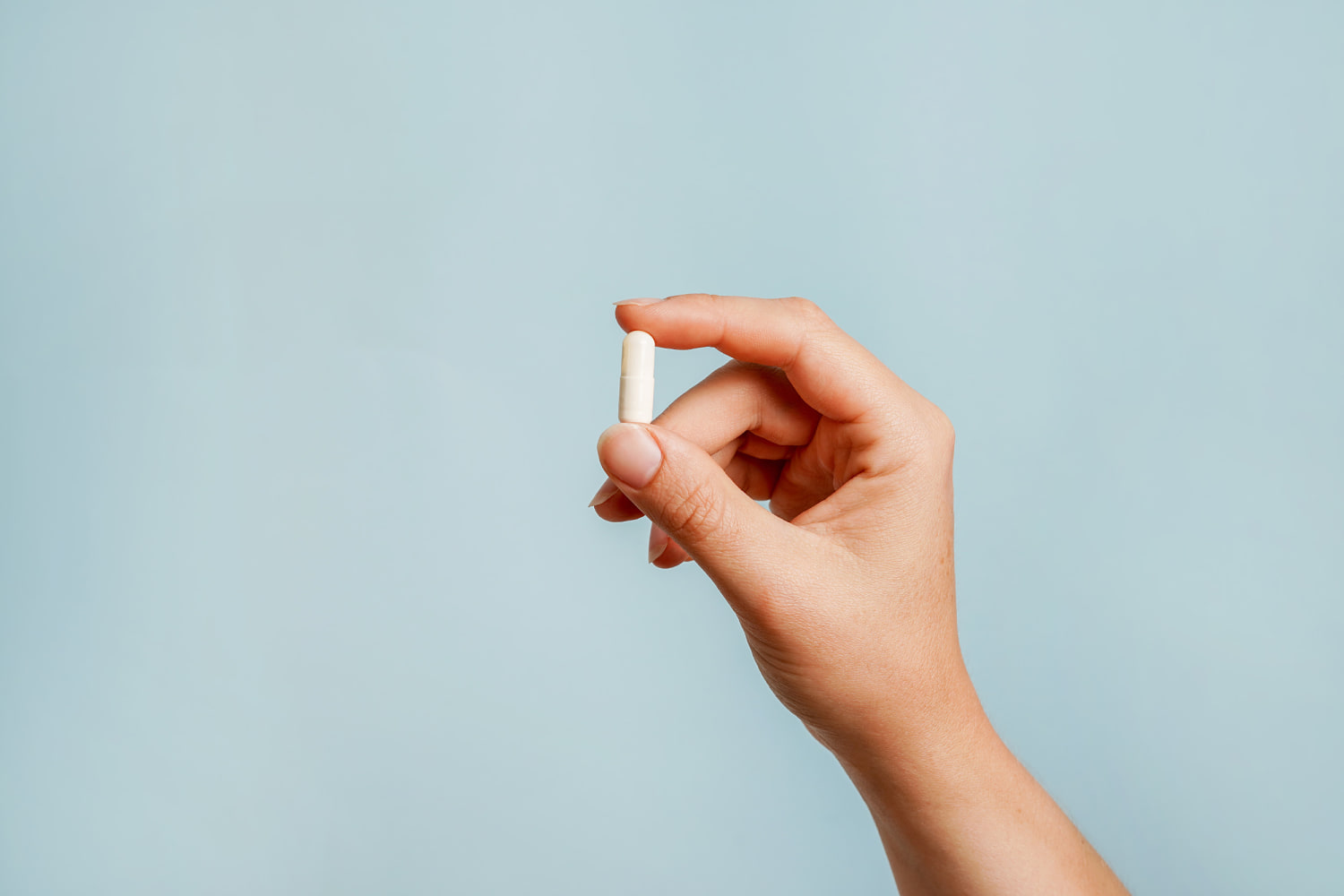
NAD supplements are the latest health trend to explode on TikTok, where people claim the supplements can help boost metabolism, improve cognition, and slow or even reverse aging. Hailed by some as a "fountain of youth," NAD supplements are popular among wellness influencers, "biohackers," and celebrities for a host of supposed benefits. Despite the promising anti-aging claims on social media and the labels on bottles, the science behind NAD supplementation is a lot more complicated.
To start, there are several types of NAD-boosting supplements, all with similar acronyms: NAD+, NADH, NR, NMN. So, what's the difference between these, and do they really work? Can NAD supplements "turn back time," or is it just hype? TODAY.com spoke with experts explain what NAD is, how NAD supplements work, and what the science says about potential benefits and risks.

Nicotinamide-adenine dinucleotide (NAD) is a coenzyme found naturally in the cells of the body, and it plays a role in energy production, Dr. Amanda Kahn, an internist and longevity medicine specialist based in New York City, tells TODAY.com.
A coenzyme is a “helper” molecule that binds to an enzymes to help carry out a chemical reaction. In this case, NAD helps the mitochondria in the cell "keep the gears running" in the reaction that makes cellular energy, says Kahn. "NAD is a really critical molecule involved in metabolism .
.. (and) making energy, which is needed for every function of the body," Christopher Martens, Ph.
D., associate professor of kinesiology and applied physiology at the University of Delaware, tells TODAY.com.
NAD helps hundreds of enzymes in the cell do their jobs. "Some of those enzymes are involved in cellular repair, so helping cells that have damage due to UV radiation, for example," says Martens. NAD also plays a role in DNA repair, inflammation, cellular signaling, circadian rhythm and more.
“It’s in all our cells, helping make energy but also helping repair ourselves,” says Martens. NAD is important for healthy aging of tissues throughout the body. Our NAD stores start to decline around young adulthood, Kahn notes.
that the total amount of NAD in the cells declines steadily with age, metabolic disorders and heart disease. “Part of that is thought to be due to the fact that we accumulate more damage over our lifespan. So all these enzymes are more active, trying to repair the damage and consuming more of the available NAD," says Martens.
NAD is commonly called by other names, including NAD+ or NADH. These are both forms of NAD — NAD+ is the positively charged form, which has lost an electron, and NADH is the neutral form which has gained an electron, the experts note. NAD+ and NADH work together to transfer electrons back and forth to facilitate energy production and other reactions, says Martens.
NAD supplementation may involve taking NAD+ and NADH, or other compounds that the body converts to NAD on its own. These are intended to raise NAD stores in the body, Kahn notes. Supplements are not intended to prevent, treat or cure disease.
NAD is also broken down in the body into molecules that can be converted back into NAD through a recycling pathway in the body, Martens says. These include nicotinamide riboside (NR) and nicotinamide mononucleotide (NMN), which are both forms of vitamin B3 (niacin) and act as precursors to NAD+, the experts explain. The main difference is NMN is one step closer than NR to becoming NAD.
"You can take these, the building blocks to make your own NAD, (instead of) taking NAD itself," says Kahn. The body also converts niacin and the amino acid tryptophan into NAD, says Martens — these are both found in some foods and available as supplements, but may not be as effective. NAD supplements may contain one or more forms of NAD and its precursors, along with other ingredients.
Always read labels closely. “When you take NAD itself, we’ve found those supplements are not very bioavailable, meaning you don’t absorb as much as we would need to boost your levels,” says Kahn. The two most popular NAD precursors, NR or NMN, are more stable and available, especially as oral supplements, says Martens.
"NAD itself is not as stable, so it's not quite as efficient to take a pill that contains NAD itself," says Martens. "It's easier to get into the bloodstream if we take in one of those precursor forms, and the hope is that our cells will know what to do with it and convert it back to NAD," says Martens. In 2022, the , as the ingredients did not meet the requirements to be considered a dietary supplement, and NMN was authorized for investigation as a new drug.
NAD supplements are sold in capsule, powder and liquid form. These may be taken or administered in the following ways: Oral NAD supplements (NAD+, NADH, NR or NMN) are the most popular, according to the experts, as they are more accessible. NAD+ shots are injected subcutaneously, or under the skin, and get absorbed into the bloodstream more quickly because it bypasses the digestive system, says Kahn.
These can be self-injected at home. NAD-boosting supplements may also be diluted in a saline solution and administered through an intravenous (IV) drip, directly into the bloodstream. "I am not a proponent of IV therapy, because I think you can get too much at once," says Kahn, adding that she prefers dividing supplements into smaller doses given over a longer period.
There is no established recommended dosage for NAD supplements, the experts note. Dosing varies depending on the type of supplement and form. Oral NAD supplements usually start around 100–250 milligrams, which may be taken multiple times per day.
Consult with your doctor to determine which dosage and frequency is best for you, says Kahn. Supplements are regulated by the FDA as foods, not drugs, and the labels (including ingredients and amounts) are not approved before the products go to consumers. Aging and many diseases are associated with reduced NAD+ levels.
There is ongoing research into the effects of NAD supplementation and potential uses. in rodents have suggested that NAD-boosting supplements may help: While the results of some animal studies are encouraging, there is limited clinical data demonstrating that NAD supplementation is effective in humans. In , healthy adults were given NR supplements for six weeks as part of a randomized controlled trial.
"It was really the first time NR had been given chronically over several weeks to humans," says Martens, who co-led the study. The results showed that NR supplements effectively increased concentrations of NAD+ in the blood. “We know in both animals and humans, if we ingest these precursors, the amount of NAD in blood goes up dramatically,” says Martens.
shows these precursors can also increase NAD+ levels in multiple tissues. "What we don’t know is whether that increase in NAD is having a real, meaningful effect on the function of our cells, and from there, the function of our organ systems and health outcomes," he adds. Preliminary research suggests NAD-boosting compounds may hold promise for humans, but more large-scale research is needed.
Many studies on NAD supplements in humans have been very small or performed in healthy individuals, as opposed to populations with risk factors associated with lower NAD. "Some trials are starting to look at groups of people that may be more vulnerable to chronic disease, and who knows, maybe that's where we'll see a bigger impact," says Martens. “The NAD stores drop with age, so that’s a very obvious target in terms of slowing down or even reversing the aging process by giving it back to you,” says Kahn of NAD supplementation.
While preclinical studies suggest NAD may help delay signs of aging, research on the effects and health benefits of NAD supplementation is ongoing, and more robust clinical trials are needed to draw conclusions about anti-aging benefits. "We're really still in the early phases of trying to figure out if this stuff is going to have a benefit or not," says Martens. NAD supplements are generally considered safe for most people when taken at the dosage recommended by a doctor, experts note.
In on supplementation with NAD-boosting compounds, researchers found that the supplements were safe and tolerable in healthy, middle-aged and older adults. However, safety data is limited, and there isn't enough evidence that NAD supplements are safe for pregnant people. If you have any underlying conditions or health concerns, talk to your doctor before trying NAD, says Kahn.
As with many supplements, there is a possible risk of mild side effects, especially in high doses. These include stomach upset, headache, or skin flushing. NAD injections may cause temporary redness or pain at the injection site, says Kahn.
"For most people, the risks are very low because we're already making these molecules in our body," she says. However, Kahn warns that NAD IV therapy presents more risks. IVs are considered safe when administered by a qualified health care professional, but there is always a risk of infection, she says.
“It really depends on who’s doing the IV. ..
. A lot of people have a person come over to do it or go to med spas, which are less regulated,” Kahn adds. If you experience negative side effects after taking NAD supplements, stop use and contact your doctor.
"You can boost NAD relatively quickly with one dose or two, but again, that's blood NAD. Whether that's actually getting into the body (and tissues) is a big question," says Martens. NAD IV therapy and injections tend to work faster compared to pills.
However, it's unclear whether one is more effective than another. The dosing regimen of NAD supplements in studies varies greatly, and more research is needed to determine the optimal duration. It may be possible to boost or maintain NAD levels naturally.
"If you're living a healthy lifestyle, then you’re at least preserving the NAD that you have and allowing those cellular pathways to do their job of recreating the NAD," says Martens. It's also important to avoid harmful habits that can put the cells in metabolic stress and use up more NAD for repair, says Martens. You may be able to increase or preserve NAD levels by: In addition to a living a healthy lifestyle, it's important to take care of your mental wellbeing and get regular checkups and screenings, the experts say.
Caroline Kee is a health reporter at TODAY based in New York City..















